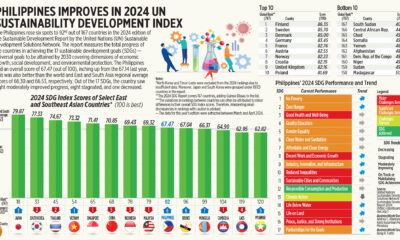Business
The Philippines looks to Estonia’s best practices as first attempt at online voting for OFWs in 2025

The Philippines aims to duplicate the success of online voting in European country Estonia, in line with the Election Commission’s (Comelec) goal to make it easier for Filipinos living and working abroad to cast their votes in the midterm elections of next year.
At a recent forum held at the Rappler office in Pasig where Comelec showcased the Automated Counting Machines (ACMs), Comelec Chairman George Erwin Garcia assured the audience that online voting will be introduced in 2025, a move that will revolutionize voting. process for millions of overseas Filipino workers (OFWs).
Garcia said the initiative aims to make voting more accessible and convenient for Filipinos living abroad, thereby significantly advancing the country’s democratic process. He noted that if successful, the Comelec could expand online voting to seniors, persons with disabilities and pregnant women in the Philippines, thereby increasing democratic participation.
Leaving no stone unturned to ensure the success of the new voting method, Garcia announced that Comelec officials had been sent to Estonia to benchmark the Baltic country’s pioneering online voting system.
“[A] Commissioner and Head of the Information Technology Department left for Estonia, the first country in the world to introduce voting. We want to learn how they secured and protected the votes of their citizens through Internet voting. Of course, it is best to get ideas from other countries that have already used the technology successfully,” Garcia said.
Estonia has been offering internet voting to all its citizens since 2005, with 41% choosing this method in the recent European Parliament elections. The Estonian model features a seven-day online voting period, while retaining the option for in-person voting, ensuring flexibility and convenience.
Designed from the ground up to complement traditional voting, the system discourages coercion and vote buying by allowing multiple online votes, with only the final vote counting. This ingenious feature, together with the rule that in-person votes override electronic votes, ensures greater election integrity.
Estonia’s system, initially developed by Estonian technology company Cybernetica and upgraded in 2014 with the help of international election company Smartmatic, provides a secure and effective online voting system to other countries such as Norway, Germany, Canada and Chile.
The introduction of the automated election system in 2010 has resulted in dramatic improvements in speed, accuracy and security in the country’s electoral process. Observers see online voting as the next level in this evolution, promising to give a voice to the vast Filipino diaspora, whose economic contributions reached a record high of $36.14 billion in 2022.
Spotlight is BusinessWorld’s sponsored section that allows advertisers to build their brand and connect with BusinessWorld’s audience by publishing their stories on the BusinessWorld website. For more information, please email online@bworldonline.com.
Join Viber on https://bit.ly/3hv6bLA to get more updates and subscribe to BusinessWorld’s titles and receive exclusive content www.bworld-x.com.













